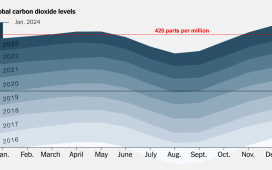“We’ve learned in other areas of development to be more sophisticated in our use of financial instruments,” Dr. Dercon said. “Somehow in the humanitarian space we just never embraced this. The humanitarian sector has lots of really good people, but it’s built around the emotion of helping people in need.”
How we react to disasters matters more than ever. This year, 168 million people will need disaster assistance, a record high. Mr. Lowcock said that in two years, that could rise to 200 million people. He said the main reasons for the increase are droughts and floods related to climate change, large outbreaks of infectious disease (often related to climate as well) and protracted violent conflicts — which are increasingly killing children, he said.
New research shows that how we respond — or not — to a disaster can follow people for the rest of their lives. A 2017 World Bank report found that prosperous countries are the ones lucky enough to avoid crises that set them back. Just as a fall can permanently damage the health of an older person, conflict, drought or epidemic can permanently make a country poorer.
Drought, particularly, is crippling, because it creates lasting malnutrition, leading to permanent cognitive and physical damage. Researchers found that without relief, a drought causes a 4 percent drop in the income of affected people — for the long term. And a speedy response is crucial. “A response time that is one month quicker has a benefit of 0.8 percent of income per capita in the long run,” the study says.
There is wide agreement on the value of having money set aside, a plan for what to do and agreement on what triggers action. But what’s needed to get that done isn’t always present. Mr. Lowcock gave the example of drought in Somalia: It’s not enough to predict hunger and famine. “We need to know at the village level who are the most vulnerable,” he said. “We’re trying to build models to answer that question for us.”
U.N. agencies are getting creative with the challenge of knowing when to help. Rebeca Moreno Jiménez, the U.N. refugee agency’s first data scientist, recently traveled to Ethiopia to interview Somali refugees, hoping to identify something measurable that can signal relief is needed. What she found was the price of goats. Refugees told her that before people flee, they sell their goats, which are too fragile to make the trip. So the crash in goat prices that would accompany a mass sell-off means people are getting ready to move. We know they will end up in Ethiopia several days later.
This work is still experimental. “We are bothering our colleagues in the Food and Agriculture Organization,” she said. “Every month, we’re asking for goat prices in Somalia.” Her program has now established an interagency dashboard where everyone can track the prices F.A.O. posts.
“Cynical people think politicians are prompted to action only when they see the starving kid in the street,” Mr. Lowcock said. “But when I talk to politicians and confront them with the fact that we can anticipate problems better than that, they get it. That’s why my fund is bigger this year than last and we are able to fund more experiments. No one wants to see a starving kid on the street and think, ‘If we’d done something earlier, we might have been able to stop that.’”
Tina Rosenberg won a Pulitzer Prize for her book “The Haunted Land: Facing Europe’s Ghosts After Communism.” She is a former editorial writer for The Times and the author, most recently, of “Join the Club: How Peer Pressure Can Transform the World” and the World War II spy story e-book “D for Deception.”
To receive email alerts for Fixes columns, sign up here.
The Times is committed to publishing a diversity of letters to the editor. We’d like to hear what you think about this or any of our articles. Here are some tips. And here’s our email: letters@nytimes.com.
Follow The New York Times Opinion section on Facebook, Twitter (@NYTopinion) and Instagram.

